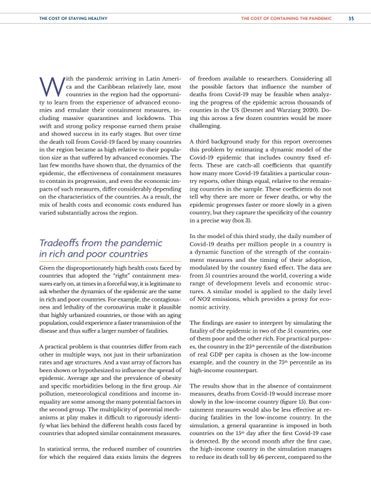The Cost of Staying Healthy
W
The cost of containing the pandemic
ith the pandemic arriving in Latin Ameri-
of freedom available to researchers. Considering all
ca and the Caribbean relatively late, most
the possible factors that influence the number of
countries in the region had the opportuni-
deaths from Covid-19 may be feasible when analyz-
ty to learn from the experience of advanced econo-
ing the progress of the epidemic across thousands of
mies and emulate their containment measures, in-
counties in the US (Desmet and Warziarg 2020). Do-
cluding massive quarantines and lockdowns. This
ing this across a few dozen countries would be more
swift and strong policy response earned them praise
challenging.
and showed success in its early stages. But over time the death toll from Covid-19 faced by many countries
A third background study for this report overcomes
in the region became as high relative to their popula-
this problem by estimating a dynamic model of the
tion size as that suffered by advanced economies. The
Covid-19 epidemic that includes country fixed ef-
last few months have shown that, the dynamics of the
fects. These are catch-all coefficients that quantify
epidemic, the effectiveness of containment measures
how many more Covid-19 fatalities a particular coun-
to contain its progression, and even the economic im-
try reports, other things equal, relative to the remain-
pacts of such measures, differ considerably depending
ing countries in the sample. These coefficients do not
on the characteristics of the countries. As a result, the
tell why there are more or fewer deaths, or why the
mix of health costs and economic costs endured has
epidemic progresses faster or more slowly in a given
varied substantially across the region.
country, but they capture the specificity of the country in a precise way (box 3).
Tradeoffs from the pandemic in rich and poor countries
In the model of this third study, the daily number of Covid-19 deaths per million people in a country is a dynamic function of the strength of the containment measures and the timing of their adoption,
Given the disproportionately high health costs faced by
modulated by the country fixed effect. The data are
countries that adopted the “right� containment mea-
from 51 countries around the world, covering a wide
sures early on, at times in a forceful way, it is legitimate to
range of development levels and economic struc-
ask whether the dynamics of the epidemic are the same
tures. A similar model is applied to the daily level
in rich and poor countries. For example, the contagious-
of NO2 emissions, which provides a proxy for eco-
ness and lethality of the coronavirus make it plausible
nomic activity.
that highly urbanized countries, or those with an aging population, could experience a faster transmission of the
The findings are easier to interpret by simulating the
disease and thus suffer a larger number of fatalities.
fatality of the epidemic in two of the 51 countries, one of them poor and the other rich. For practical purpos-
A practical problem is that countries differ from each
es, the country in the 25th percentile of the distribution
other in multiple ways, not just in their urbanization
of real GDP per capita is chosen as the low-income
rates and age structures. And a vast array of factors has
example, and the country in the 75th percentile as its
been shown or hypothesized to influence the spread of
high-income counterpart.
epidemic. Average age and the prevalence of obesity and specific morbidities belong in the first group. Air
The results show that in the absence of containment
pollution, meteorological conditions and income in-
measures, deaths from Covid-19 would increase more
equality are some among the many potential factors in
slowly in the low-income country (figure 15). But con-
the second group. The multiplicity of potential mech-
tainment measures would also be less effective at re-
anisms at play makes it difficult to rigorously identi-
ducing fatalities in the low-income country. In the
fy what lies behind the different health costs faced by
simulation, a general quarantine is imposed in both
countries that adopted similar containment measures.
countries on the 15th day after the first Covid-19 case is detected. By the second month after the first case,
In statistical terms, the reduced number of countries
the high-income country in the simulation manages
for which the required data exists limits the degrees
to reduce its death toll by 46 percent, compared to the
35



